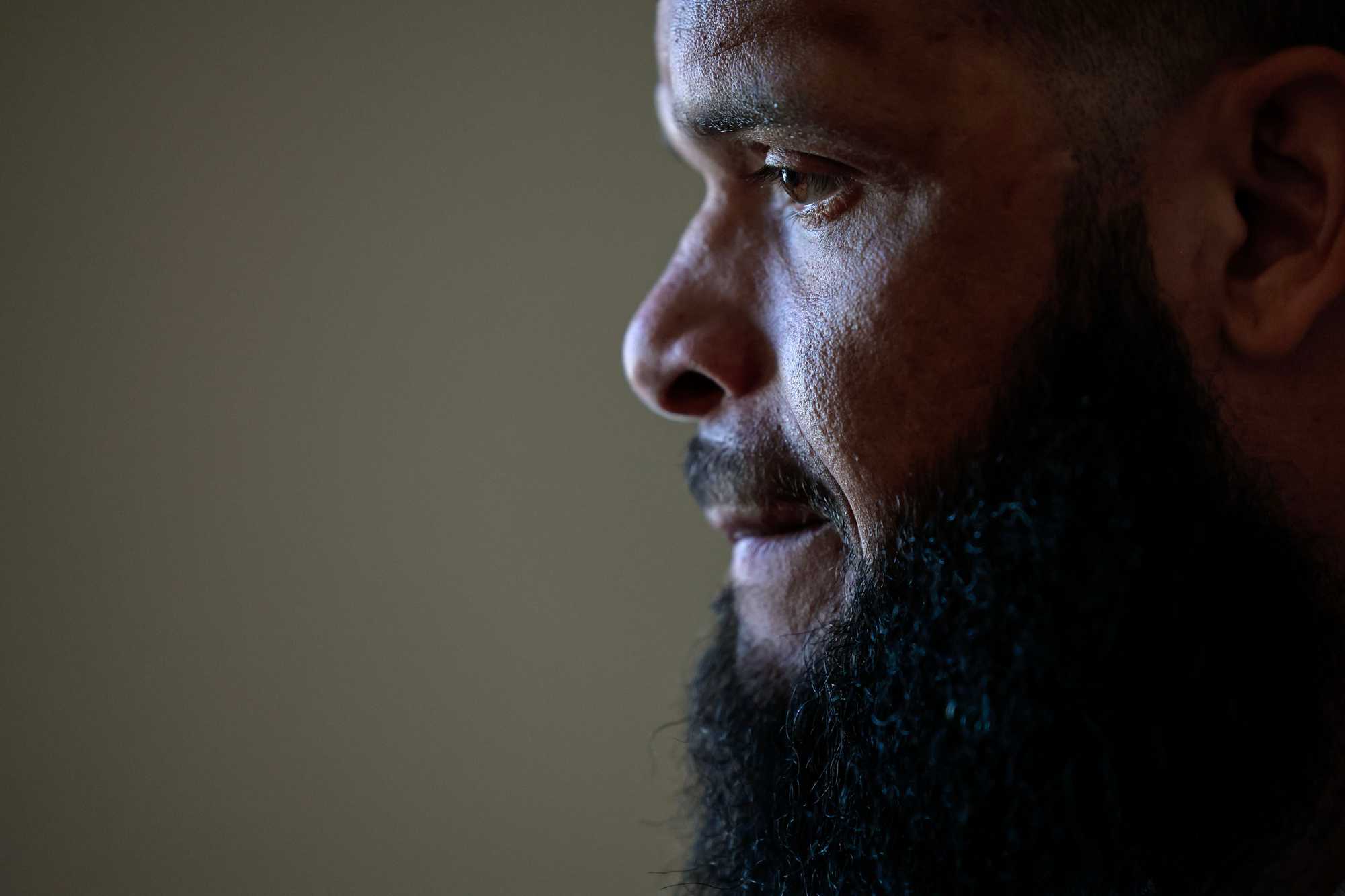
‘I don’t want to fight no more’: Members of the Outlaws take stock of the destruction — and seek atonement
“You’re my brother,” Odair Fernandes said into the phone. He was calling from a cell block at MCI-Norfolk. He and Milton DoSouto, once gang brothers, talked most every day. He’d been behind bars for more than a decade now, convicted of a brutal murder to avenge the shooting that left Milton partially paralyzed.
Police said that Odair had run into the street that day when fell, firing a gun at the shooter’s car as it sped away and that he ran back to kneel over Milton’s bullet-ridden body, shouting, “Somebody’s going to die for this.”
Blood on the streets
![A stabbing in Dorchester ignites an all-out war. One family becomes the perpetrators — and the victims.]()
Part 1: A stabbing in Dorchester ignites an all-out war. One family becomes the perpetrators — and the victims.
![Their brother’s death in the Cape Verdean gang war sparks another violent chapter. When would it end?]()
Part 2: Their brother’s death in the Cape Verdean gang war sparks another violent chapter. When would it end?
![‘I don’t want to fight no more’: Members of the Outlaws take stock of the destruction — and seek atonement]()
Part 3: ‘I don’t want to fight no more’: Members of the Outlaws take stock of the destruction — and seek atonement
Eleven nights later, according to prosecutors, Odair was in a group of seven that hunted down two friends of the enemy Wendover gang and opened fire. One was killed instantly. Another, a nephew of the peace activist Isaura Mendes, was paralyzed from the neck down and died four years later.
Odair had felt it his duty to protect Milton. Milton was his best friend, a leader of their gang, the Cape Verdean Outlaws, the one who had made him into a street soldier. Even in prison, Odair had kept fighting gang rivals, not at anyone’s command but out of loyalty to Milton and the Outlaws. He spent a long time in solitary confinement for the violence. But now, he was trying to tell Milton something new.
“You’re my brother,” he repeated. “Whoever is beefing with you guys, they’re beefing with me. But I don’t want to fight no more.”
Milton was stunned. He had no idea how much blood Odair had spilled fighting for him behind bars. Odair rarely talked about cellblock assaults on the prison phone. Now he was asking permission to stop violently representing the Outlaws. Milton gave his blessing. He had come to feel intense guilt for nurturing Odair’s fury and demanding his loyalty. He felt as if he alone had landed Odair in prison for life.
“I put so much blame on myself that whatever he asks of me, I do it without question,” he said.
By then, the pace of the war’s killing had slowed. It no longer preoccupied Milton day and night. But he carried dark memories and grief. He had no job and couldn’t walk without difficulty and pain. He was beginning to see the destruction the war and his path through it had brought. And he wondered if there was a way to atone.
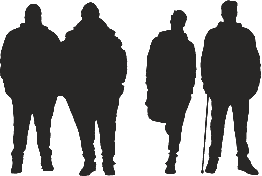
In their almost daily phone conversations, Odair said there were many reasons for his change of heart but one was . She had lost two sons in the war, one likely at the hands of the Outlaws as retribution for the killing of Milton’s older brother. Her sisters had lost four of their sons including the one Odair was accused of shooting.
Isaura came regularly to the prison. She talked to gang killers. She forgave them. She brought them together with families of their victims, for them to see the faces of parents or siblings broken by loss — and, on many occasions, to hear from the survivors their own words of forgiveness. Hardened killers sometimes wept at these meetings. Sometimes they were transformed.
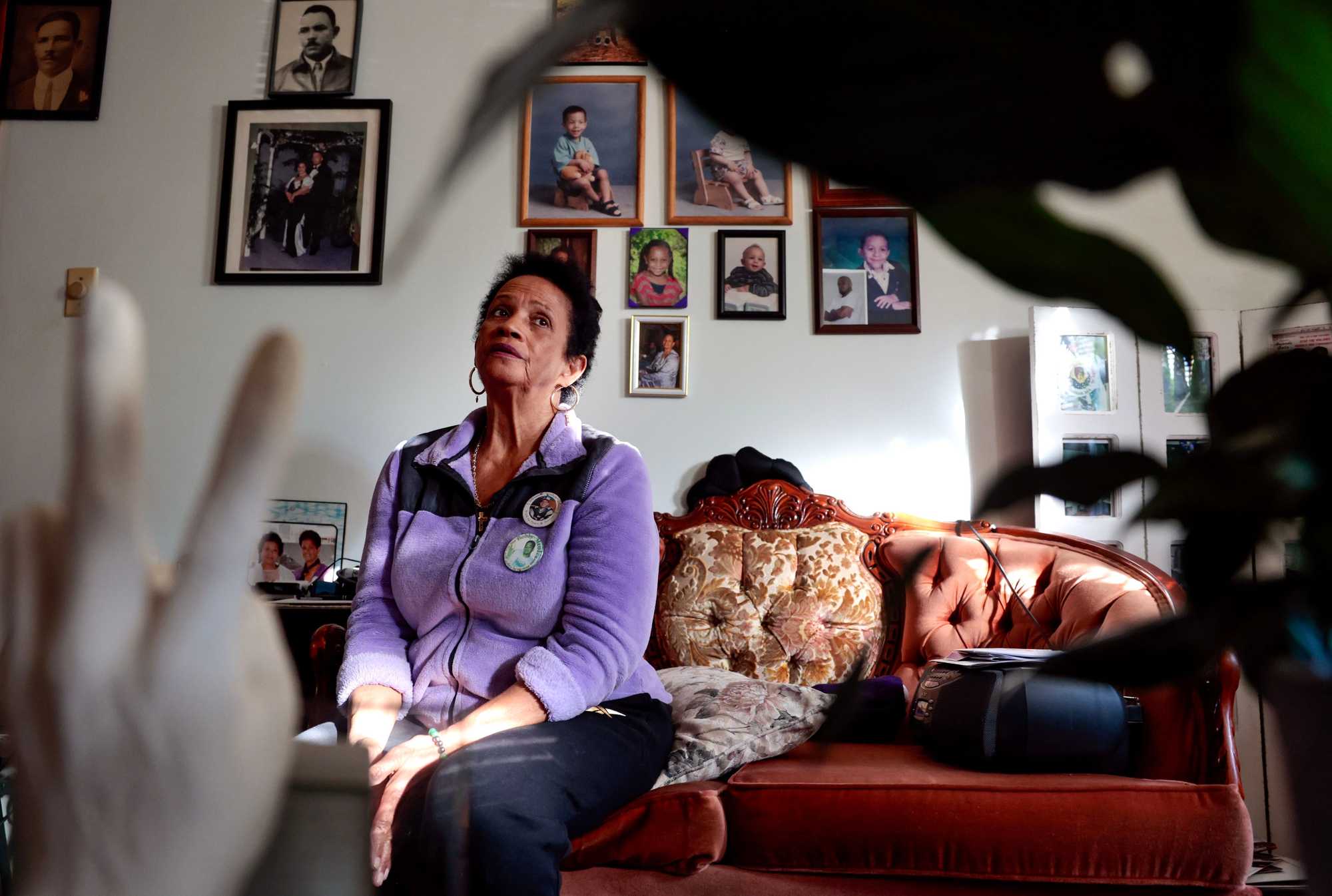
Isaura Mendes, in her Dorchester home, reflected on the loss of her murdered sons, Bobby and Matthew, and the street violence that for decades plagued her community. (Craig F. Walker/Globe Staff)
Odair found himself sitting next to Isaura in a prison auditorium during one of her visits. He knew who she was, but she didn’t recognize him. He introduced himself. Then, he told her he was accused of killing her nephew. She turned to him, surprised. She said she didn’t know. Then, she put her arms around him and hugged him, as she would later say, “like he was my son.”
It was like a spark of light for Odair. He wanted more. Isaura told him there was something he could do for her. There were leaders of Cape Verdean gangs at MCI-Norfolk, many of them still running crews on the outside, propagating the war. Make peace among them, she said. Bring them together.
The request was almost laughable. Convincing men like these, with decades of entrenched hatred, to just put it aside was nearly inconceivable. But Odair promised to try.

In prison, Odair was working with another inmate, John Gomes, once a notoriously violent Cape Verdean gang member, and two former gang enemies. They launched a campaign to persuade other incarcerated gang members to help end the fighting. They called it “Tudo Djunto,” Cape Verdean Creole for “all together.” Soon, they were making headway. Dozens were joining, others were willing to listen.
With this new mission, Odair was finding new confidence, but Milton felt lost. He told Odair he needed to confront his dark memories, and the things he had done. Maybe writing about it would help, he said. Maybe he could even turn it into a book. If only he could find the courage to start. He had never finished school. People like him didn’t write books.
Write it, Odair told him. Get off the couch and write.
He told Milton to do it for him.
“We caused so much harm and endured so much pain,” Odair said. “Tell these stories for our community, but not in a glorifying way. It should be a lesson.”
The pandemic was setting in. Milton had a young daughter, Isabelle, from a previous relationship and now was living with a new partner. They were expecting a baby, a boy they would name for Milton’s slain brother, , and for , the first Outlaw killed in the war. His name would be Alex Junior DoSouto.
Milton now felt obligated, with Odair pushing him, to begin writing. After his son was born, Milton stayed up nights, bottle-feeding and writing. He often wept, with his baby in his arms, as he relived his life. He recalled the priest, Richard “Doc” Conway, privately appealing to him and his brother Mike after Alex’s murder to end the cycle of violence. He remembered his father’s anger and grief when Milton dropped out of school, shouting that he wanted Milton to be better than him, not “a bum, a janitor, a nobody.”
Those nights, his tiny child nearby, Milton wanted to make the world different for his son. And his father. And his community.
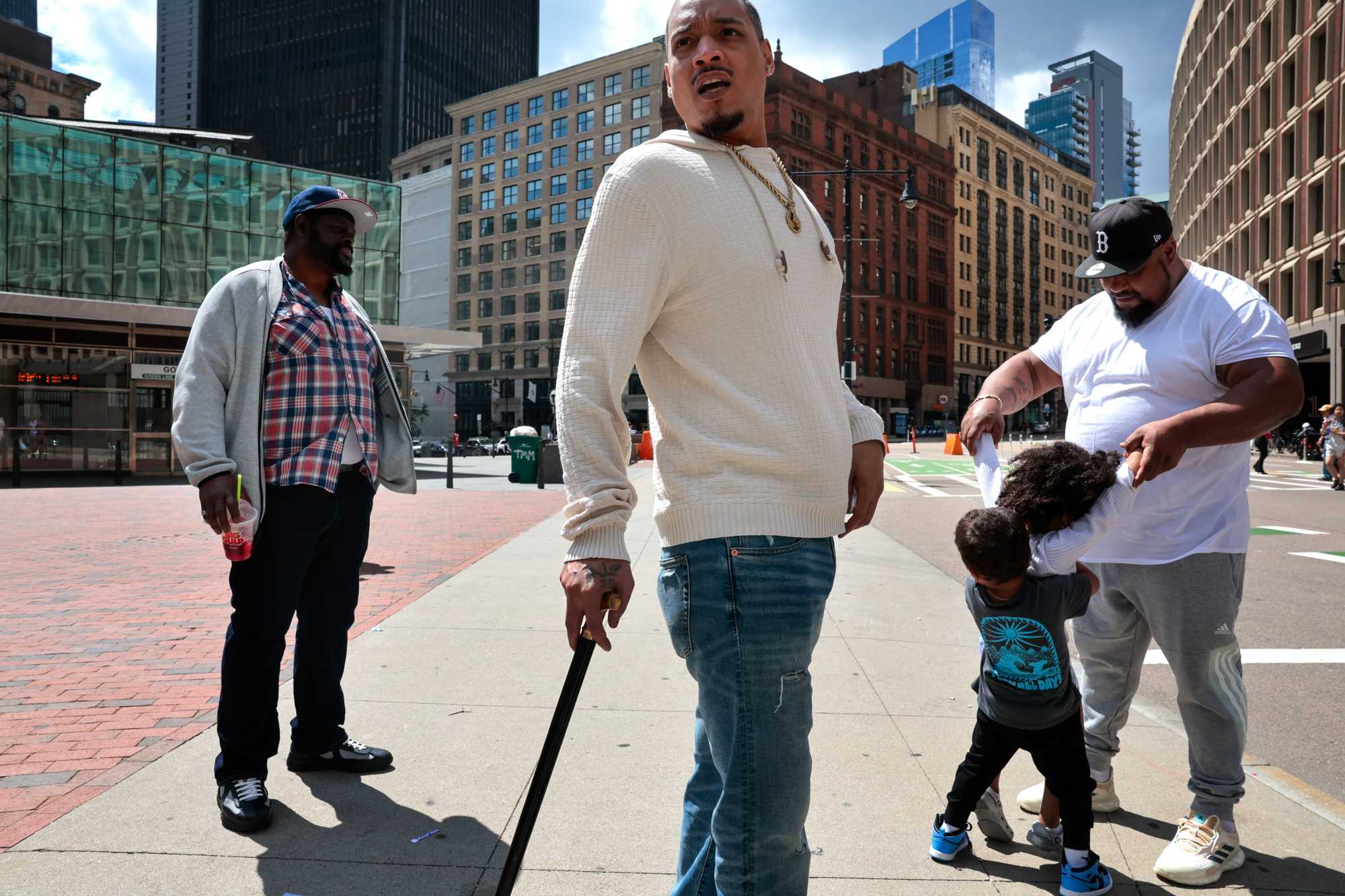
Milton DoSouto (center) took in the scene while his brother, Mike Fernandes, entertained children, at City Hall Plaza in May 2024. Family and friends had gathered at Suffolk County Superior Court to attend a hearing for Odair Fernandes. (Craig F. Walker/Globe Staff)
Advertisement

Milton finished the book, “Young Outlaws: I Am Junior,” and published it under the pen name Bumbya, his uncle’s nickname for Alex, his slain brother. He wrote it, too, for Isabelle, now 13. He started writing a second book and making appearances to promote their messages of peace and reconciliation. And the more he talked, the stronger he felt about expanding his reach.
Do more, Odair urged him. Milton accepted the challenge, and he found a natural ally in his brother Nugget, who already had spent years mentoring kids in his basketball programs. Together, they connected with Mayor Michelle Wu’s office and received support to produce an event — “Tudo Djunto: All Together We Can End the Violence” — and publicly declare an end to hostilities between major players in the Cape Verdean war.
One afternoon last August, Milton sat on stage under a gleaming spotlight in the Boston Public Library’s venerable Rabb Lecture Hall. To his left sat a former gang member whose nephew had once shot Milton in the chest. They had made peace. Seated nearby were Nugget and 20 boys and girls he was trying to spare from violence.
“We caused so much harm and endured so much pain. Tell these stories for our community, but not in a glorifying way. It should be a lesson.”—Odair Fernandes
Then the auditorium door opened, and in walked a man named Mario Rodrigues, accompanied by more than a dozen current and former members of gangs with roots around Wendover Street. It was a hot summer day, yet some in the entourage wore hoodies, a sign they could be armed. It was Rodrigues’s brother who had pumped seven bullets into Milton, rendering him permanently disabled and in perpetual pain.
As Rodrigues strode to the stage, at Milton’s invitation, Milton thought not about revenge but reconciliation.
“Mario, it’s love now,” he said. “If you see me on the streets, give me a hug, bro, because the war is over for me.”
Rodrigues reached for a microphone.
“As I speak here in front of them,” he replied, gesturing to the men he walked in with, “you are not my enemy; you are my family.”
Odair appeared through a Zoom call from prison. He was 41 now and had spent more than half his life behind bars. He talked about the promise of bringing enemies together. But soon a woman in the front row was sobbing and shouting up at Milton.
“Look what you have done,” she wailed. “I used to go to your mother to keep him away from your house, but he kept going back. Now you see what you have done.”
It was Odair’s mother, Maria. Now Milton was fighting back tears.
“It’s my fault he’s in prison for life,” he said. “It’s my fault.”
Waves of emotion passed through him. Sorrow, guilt, hope that one day he could help bring Odair home.
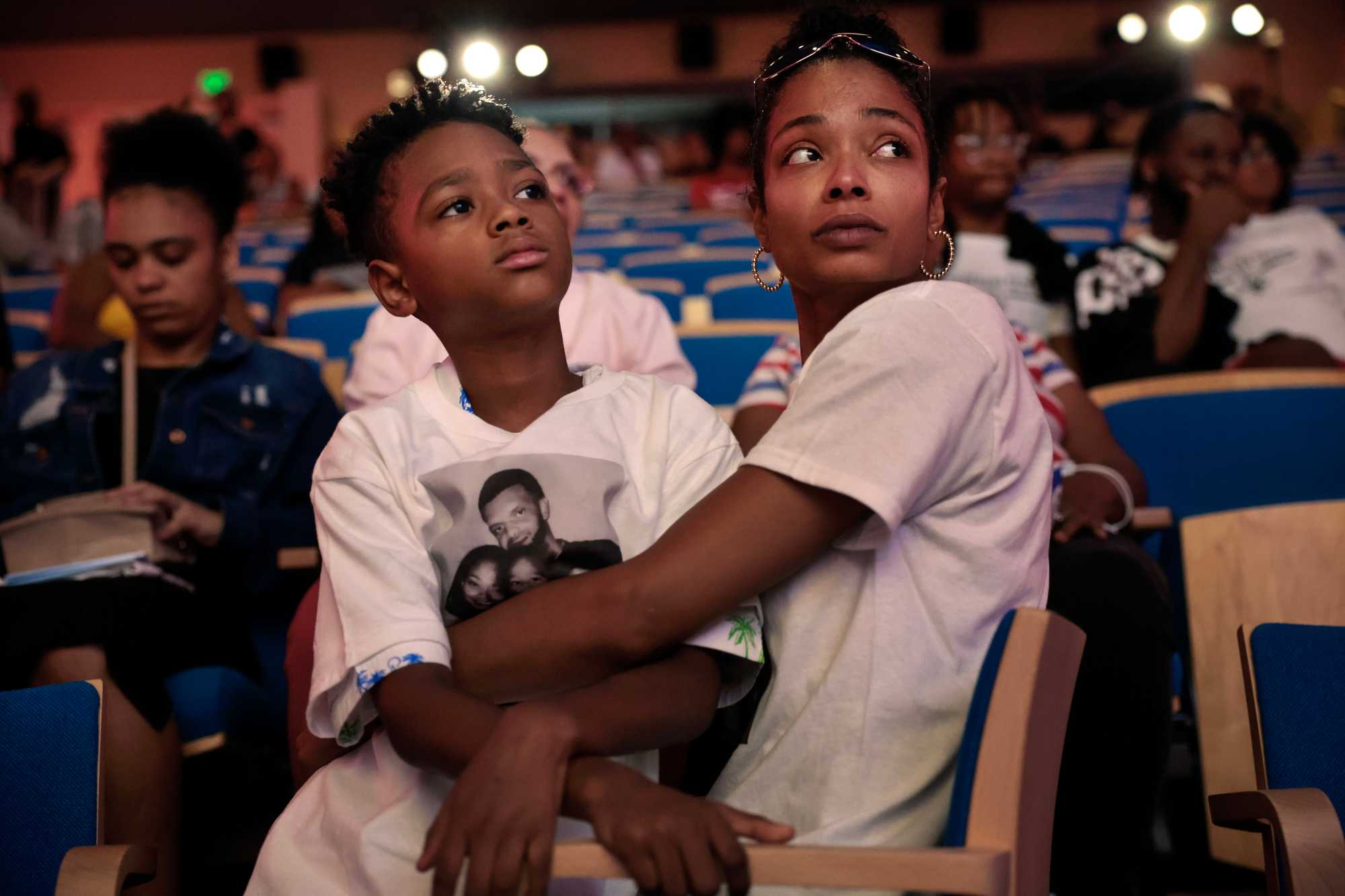
Deanna Neal Fernandes sat with her son, Camden, 10, during the "Tudo Djunto - All Together We Can Stop Violence" community forum at the Boston Public Library. Her husband, Odair Fernandes, joined the conference by video feed from MCI-Norfolk. (Craig F. Walker/Globe Staff)
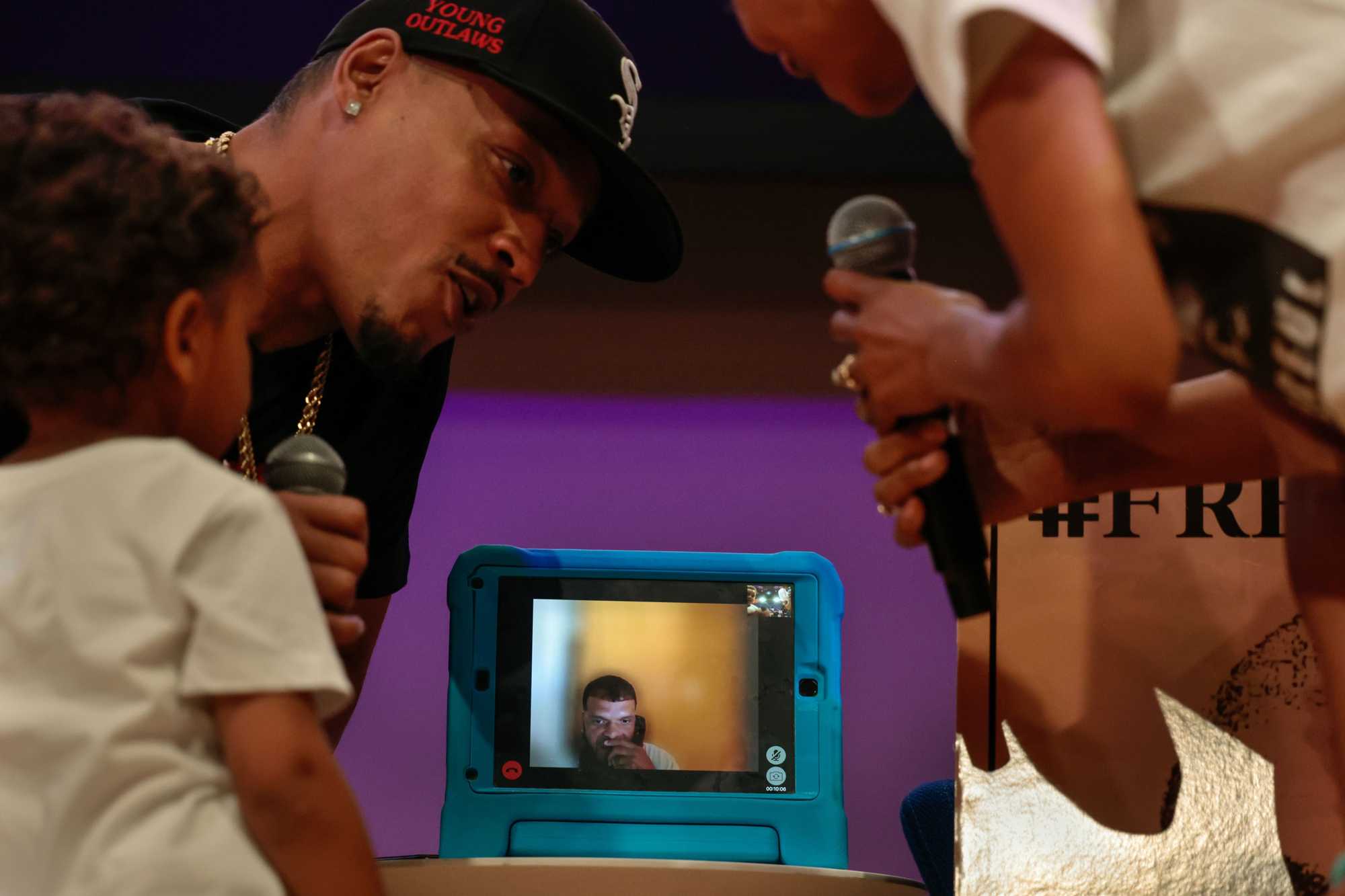
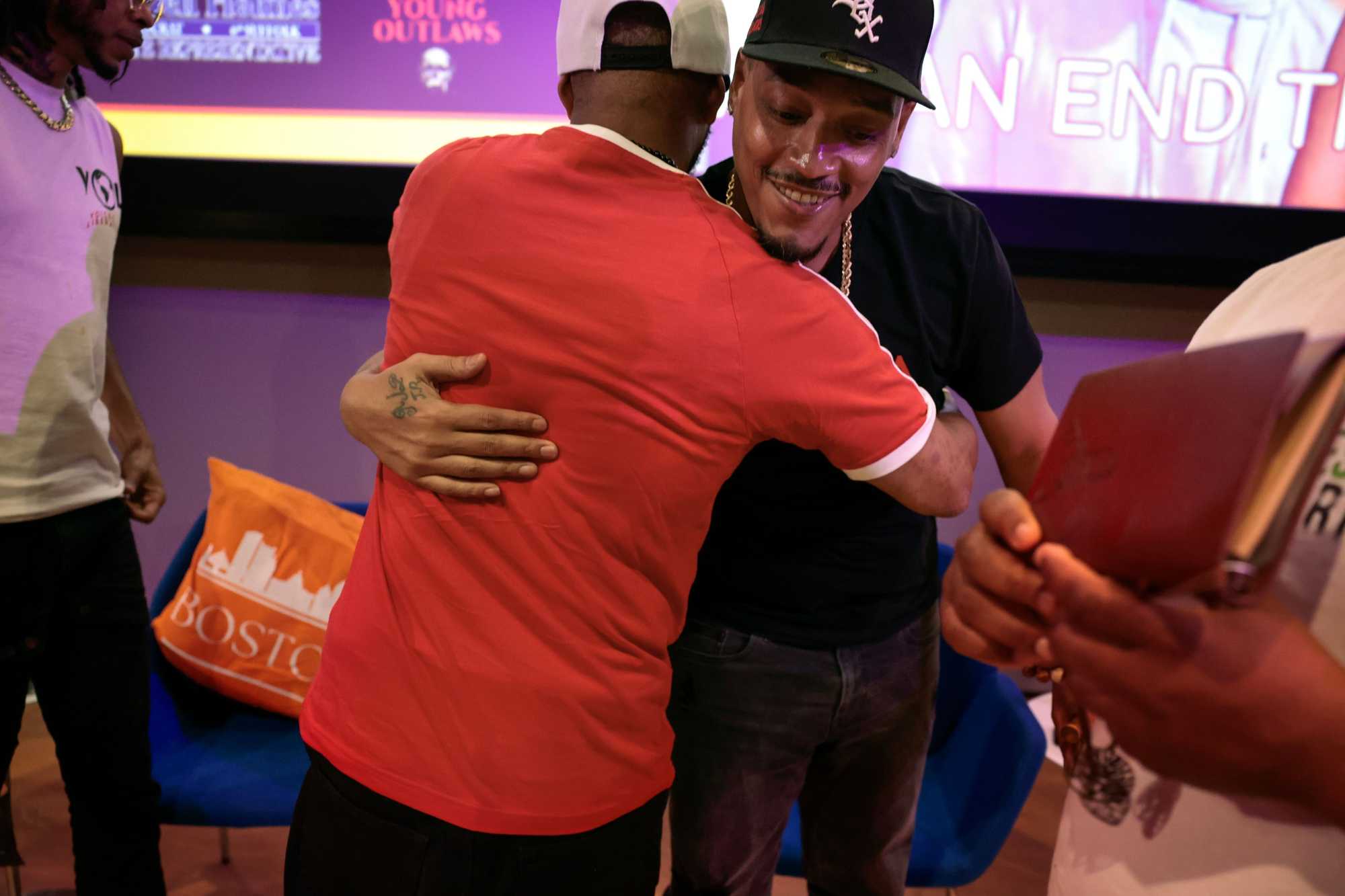
Left: Odair Fernandes spoke over a video feed during the "Tudo Djunto: All Together We Can End the Violence" community forum at the Boston Public Library while Milton DoSouto, his son Alex, and Fernandes's wife, Deanna, gathered around. Right: Milton DoSouto, who led the Cape Verdean Outlaws with his brother Mike, made peace at the community forum with Mario Rodrigues, a former gang rival whose brother shot Milton seven times, nearly killing him. (Craig F. Walker/Globe Staff)
That moment arrived in January, when Milton limped with his cane to a witness stand in Suffolk Superior Court and recounted his role in Odair’s path to prison.
Judge Anthony Campo, acting on a state Supreme Judicial Court ruling that found it unconstitutional to sentence people under the age of 21 to life without parole, was reconsidering Odair’s case. Odair originally was sentenced to serve his natural life for murdering one man and an additional 16 to 18 years for attempting to murder the other who died later of his wounds. He was 19 at the time of the shootings.
Milton and two clinicians told Campo about Odair’s tormented youth and his good work behind bars. Then Odair, before a packed courtroom, stood up, handcuffed and shackled at the ankles. He had served 7,897 days behind bars, all while maintaining his innocence. He described the two shooting deaths as “a tragedy.”
“I know that the victims' families have had to endure a tremendous amount of suffering and pain, and for that I want to say today that I am truly sorry for their loss,” he said.
The judge commended Odair for pursuing peace behind bars long before he knew he might one day have a chance to go free. He resentenced Odair to life with eligibility for parole after 15 years for the murder and reduced his sentence for attempted murder by five years, meaning that Odair, with more than two years of good time to his credit, could be eligible for parole as soon as this year.
Almost immediately after the hearing, one of the victims’ sisters offered Odair forgiveness. He was “a young boy” back then, she said on social media, like so many others whose lives were lost or ruined in the war.
Advertisement

Much has changed in Boston’s Cape Verdean community since the war broke out. The police force then included only a small number of Cape Verdean American officers but now has 90 or more. The schools stepped up their Cape Verdean language programs and hired teachers of Cape Verdean descent. The city enlisted community liaisons and beefed up trauma and youth services. Cape Verdean Americans were elected to state and local offices. The streets where so many Cape Verdeans settled are defined now not by the legacy of the years of violence but by the pride of their heritage, the warmth of their culture, and their hope for enduring peace.
“There’s still a lot we need to do, but we’re in a better position than we used to be,” said Paulo De Barros, executive director of the Cape Verdean Association of Boston. “It’s a different Boston.”
The eldest surviving DoSouto brothers -- Milton, Mike, and Nugget -- have all moved away from Hamilton Street but often visit the family home. Mike works long hours managing and rehabbing real estate he owns and helping to raise his six children, five teenagers among them. He supports Milton and Nugget in their peace efforts, but he remains vigilant. Memories of the war still rage within him.
“To this day, you’re not playing around with my family and getting away with it,��” he said.
He is still deeply unsettled by his brother Alex’s murder, which remains unsolved more than a decade later.
“At the end of the day, the only thing I want to hear is who’s responsible for [killing] Alex,” he said.
Mike stays ahead of the ghosts that trouble him by laboring long hours.
“I function like a drug addict,” he said. “They get their fix and keep moving. If I stay busy and keep my mind occupied, I’m all set.”
He traveled to Dubai last year with his partner Nikki Louis to fulfill a dream of dining atop the tallest hotel in the world. But he found no joy.
“Nikki was expecting me to be excited, but she never got the excitement from me because I was thinking about my brothers and my mother and everybody else,” Mike said. “I try to get that happiness, but it never works.”
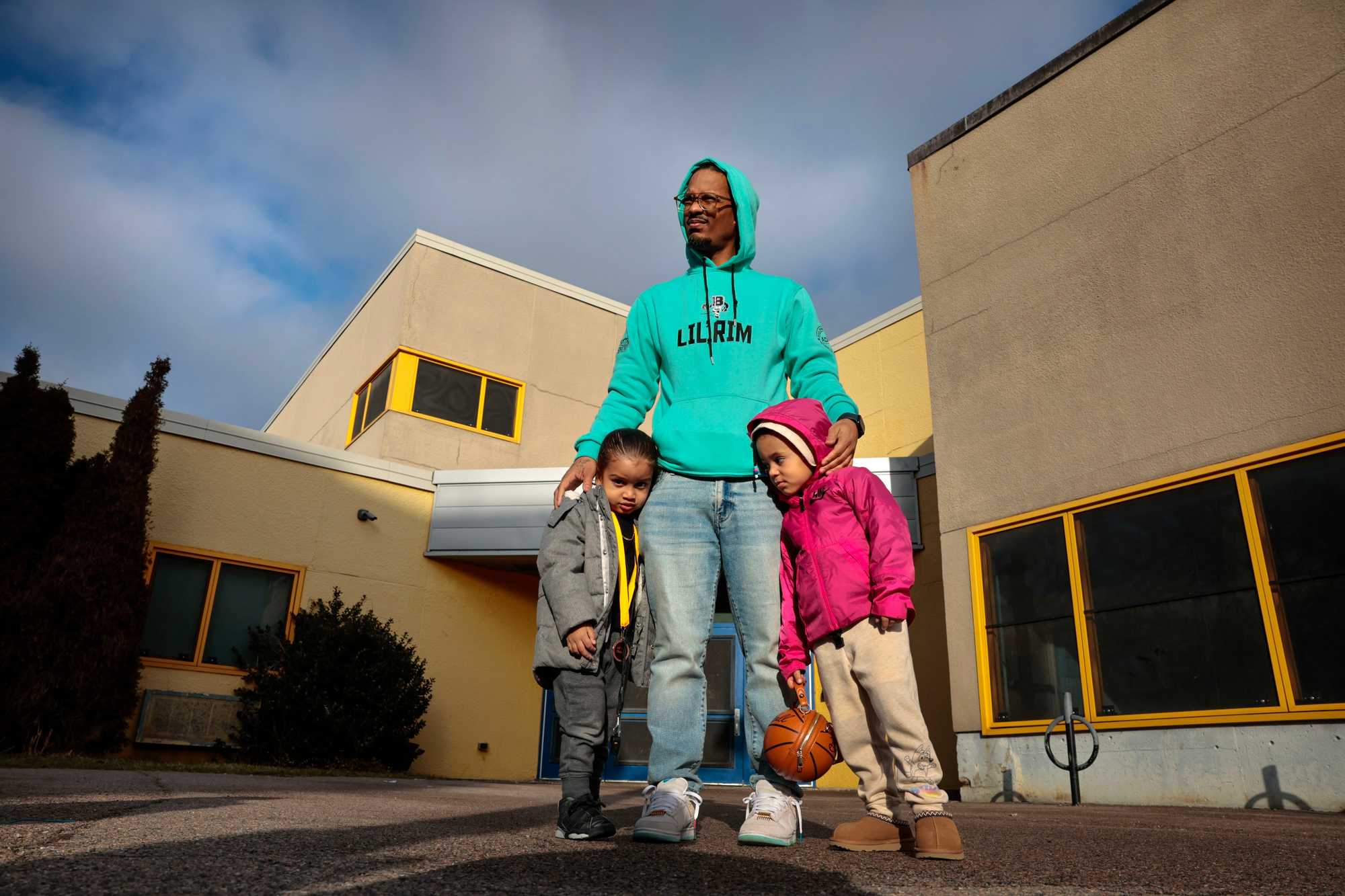
Steve “Nugget” DoSouto, joined his nephew Alex, 4, (left) and daughter, Nova, 4, outside the Holland Community Center following one of his Beantown SLAM children's clinics. Alex, the son of Nugget’s brother Milton, is named for his late uncle (Craig F. Walker/Globe Staff)
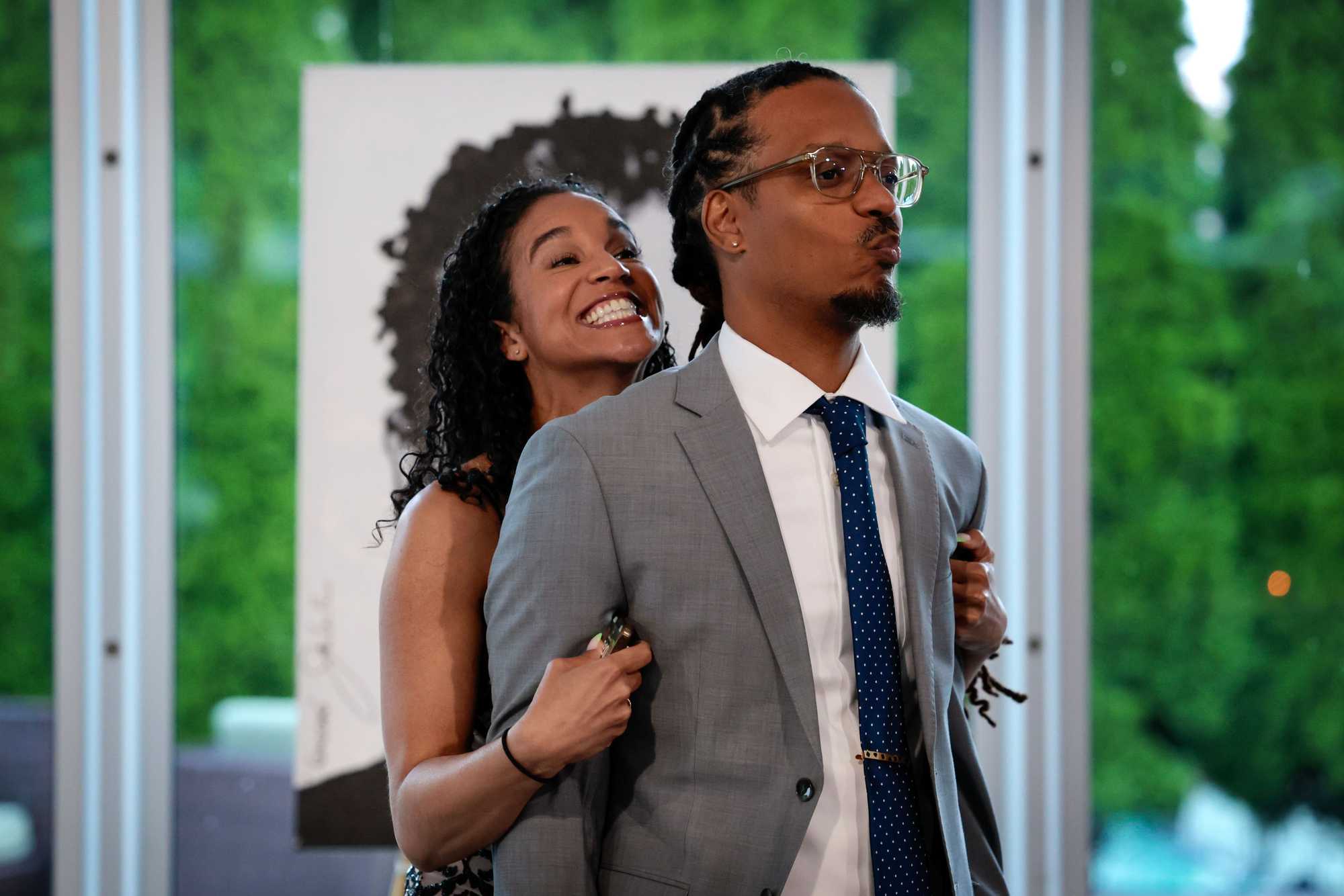
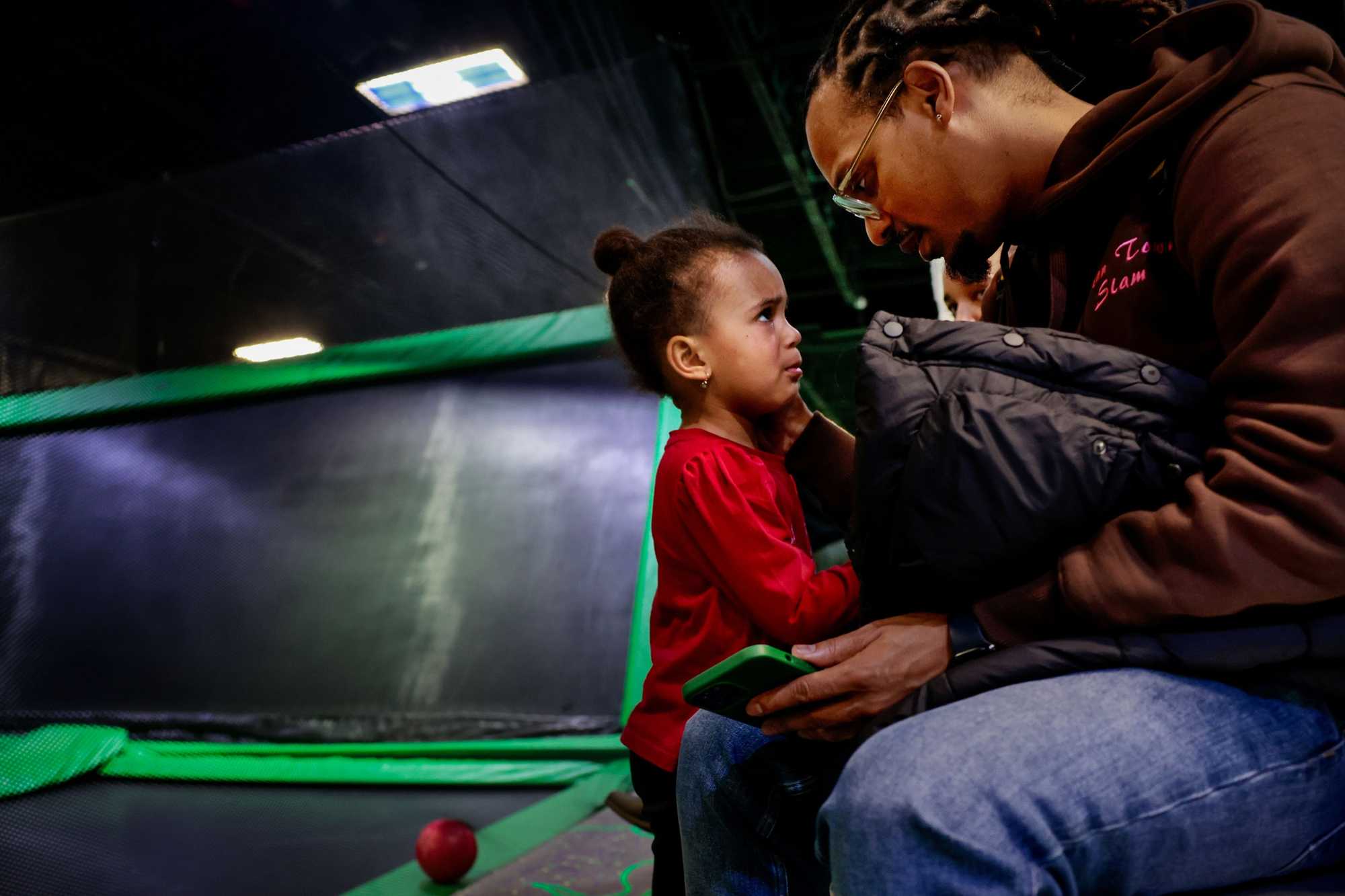
Left: Steve "Nugget" DoSouto does not seek public attention, but his partner, Carla Daveiga, enjoyed the moment on a night he is honored by the Cape Verdean Association of Boston. Right: Nugget DoSouto shared a moment with his daughter Nova during trampoline play time. (Craig F. Walker/Globe Staff)
Nugget, for better or worse, has mastered burying his pain. A father now, too, he can’t remember much of his life during his family’s war years. It’s a symptom of the trauma, he has learned. Some of the memories he does retain haunt him.
Nugget works daily in the old neighborhood, where his basketball charities have vastly expanded. He puts on camps and leagues, leads mentorship workshops, runs evening festivals in the summer, high school tournaments in the fall, and is looking for funding for his nonprofit Beantown Slam to consolidate his programs under one roof. At Christmas, he gives away toys to hundreds of kids. He has been honored by the mayor, civic groups, and the Legislature.
Nugget doesn’t particularly like the attention, preferring to focus on the young people who come to him. There were so many he couldn’t save when he was younger — Junior, Odair, Luis, Alex. It left an ache that never goes away. Basketball was his refuge back then, he said. The game provided him purpose amid the chaos, and a kind of beauty. “Basketball saved my life,” he said. “I’m trying to do the same for these kids.”
He regrets not having a chance to say goodbye to his mother, , before she died unexpectedly in 2022 at 66. The official cause was complications from diabetes, but her children believe it was the war. “It ruined my mom,” Milton said. “She was never normal after the house started getting shot at.”
Losing two sons to gun violence did her in, her family believes. By the end, “she was ready to go,” Nugget said. “She already had witnessed and felt so much.”
Their father, Alfredo, is 77 and still lives in the house on Hamilton Street. He mourns his wife and slain sons and tries not to think about the long fitful nights when he lay in bed bracing for the enemy gunmen who came to “shoot — boom, boom, boom — and you don’t know who might get hit.”
Alfredo’s eyes sparkle on visits from his grandchildren. Milton and Mike visit regularly, trying to bring comfort to the home where they long brought violence. Healing remains elusive, though.
“They’re putting the weight on themselves to try to mend things,” said their sister Christina, a mother now, too, who holds a bachelor’s degree in criminal justice and is pursuing a master’s in clinical psychology. “But it’s hard because we’ve all been through so much pain.”

Isaura Mendes keeps a Bible in each of the 14 rooms of her house. Some of them are open to the Book of Matthew and its exhortation to forgive. The walls of one room are covered with awards and citations she has received for preaching the power of forgiveness. Years ago, she found the strength to stand in court and forgive the killer of her first-born son, Bobby. But she has not done the same for the killer of her youngest son, Matthew, because he has never been identified.
It was no secret in Isaura’s community that Matthew likely died at the hands of Milton and Mike’s Outlaws. Yet the police never concluded anything, and she has been forced to bear the uncertainty.
In August, Milton made an offer to Isaura that once would have seemed unfathomable. He invited her to the “Tudo Djunto” event at the library. She was unable to attend but suggested they meet at the cemetery where her sons and Milton’s brothers were buried near each other. Milton brought his son, Alex, now 4 years old. They talked there for more than an hour, she about loss and faith, he about grief and his part in the violence.
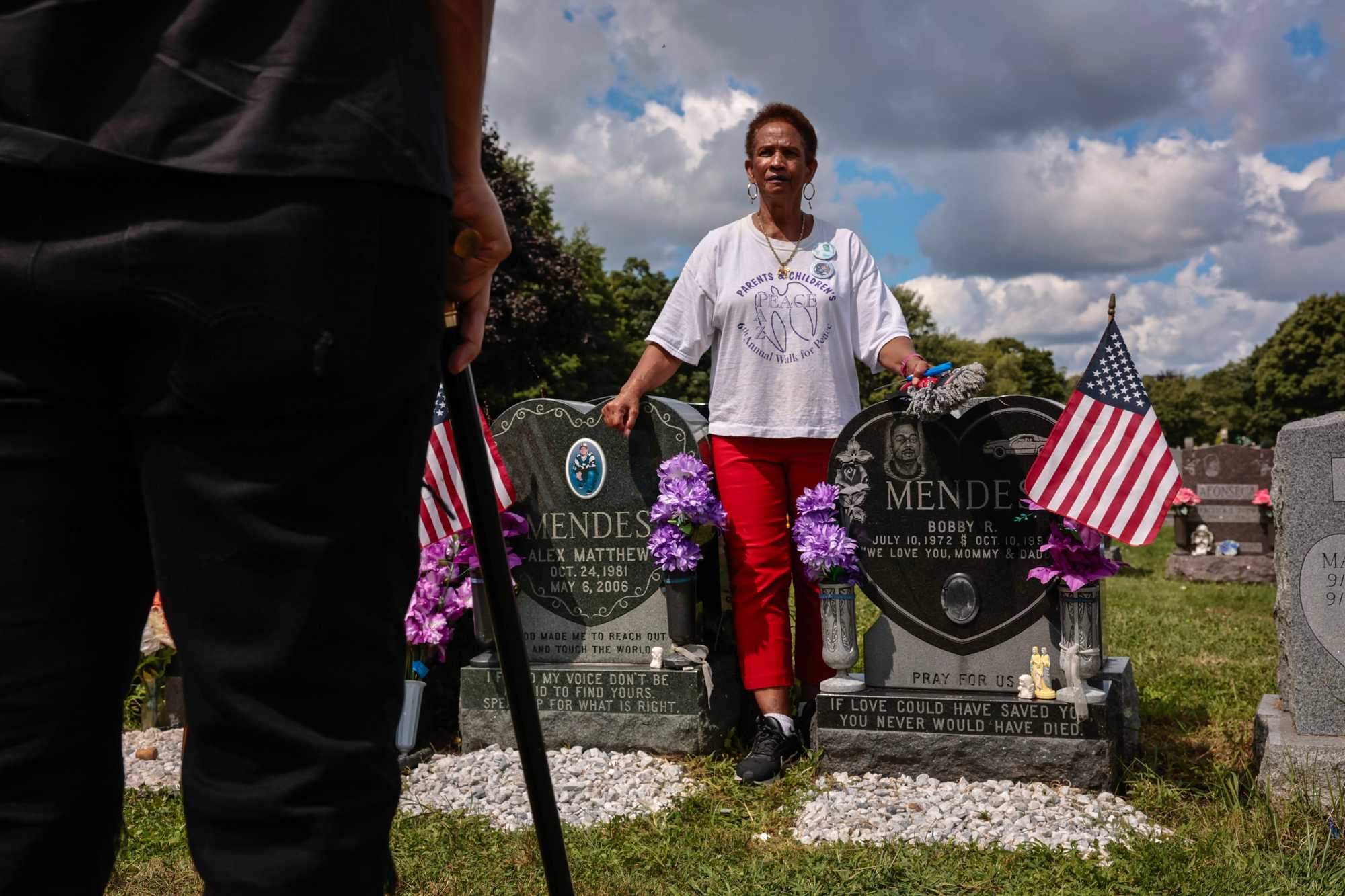
Isaura Mendes spoke with Milton DoSouto at the graves of her slain sons, Matthew and Bobby, at New Calvary Cemetery in Mattapan. DoSouto's brothers, Luis and Alex, both also victims of deadly street violence, are buried just steps away. (Craig F. Walker/Globe Staff)
“It was crazy back then,” he said. “I’m sorry for it all.”
Isaura told him she still had the strength to forgive, if only she knew who killed Matthew. But if Milton knew, he didn’t say.
She would leave the cemetery no closer to knowing who took her son’s life. But sometimes she would think that maybe the only answer was that there was no answer, no one in particular to blame, and that the rage behind so much of the war’s killing was the product of pain and frustration, rendered as senseless vengeance. Matthew’s killers had come that night, she now believed, “just because they were angry and wanted to shoot the neighborhood.”
Isaura and Milton stood under a blue summer sky in the cemetery and embraced. At their feet lay gravestones, row upon row. Her sons, his brothers, her nephews, his cousins, and on and on, countless Cape Verdean boys and men who died too young. As they spoke of their shared mission, Milton’s son stood by them.
“It’s really not for us,” Isaura said. “It’s for the next generation.”
Advertisement
Credits
- Reporter: Bob Hohler
- Editors: Steve Wilmsen, Mark Morrow
- Visuals editor: Tim Rasmussen
- Photographers: Craig Walker, Matt Lee, John Tlumacki, Jonathan Wiggs
- Director of photography: Bill Greene
- Photo editor: Kevin Martin
- Photo archivist: Colby Cotter
- Digital editors: Christina Prignano, Katie McInerney
- Design: John Hancock
- Development: Daigo Fujiwara-Smith
- Copy editor: Michael J. Bailey
- Quality assurance: Nalini Dokula
- Audience: Cecilia Mazanec, Adria Watson
- Audience editor: Heather Ciras
- SEO strategy: Ronke Idowu Reeves
© 2025 Boston Globe Media Partners, LLC





